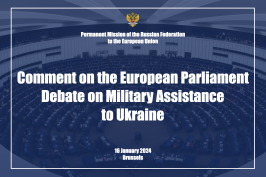We are still getting used to observing the processes taking place in the European Union. The nature of what was once an integration association focused on trade and economy is changing right before our eyes. This time in Strasbourg the literal warmongers have joined in an anti-Russian frenzy. Their obsession knows no bounds. They are not spending their own money; they are using others to wage war. Ukraine is perceived solely as a tool to inflict a "strategic defeat" on Russia. Their minds have gone blank on the fact that the unchecked pumping of arms into Kiev contradicts both international treaties and the EU common position on arms exports. "More and faster" is the motto of those MEPs who do not consider the consequences, neither for Ukraine nor for the European continent at large. While earlier the EU refused to recognise its involvement in the conflict, today a European institution has heard the words that the EU is at war.
A German MEP even uttered an eloquent phrase about the "Russian fascist aggressor". Well, if the burden of historical responsibility has to be shaken off, it should be done through repentance for the crimes committed and reconciliation, not by intimidating the public with epithets reminiscent of the time when Nazi Germany mobilised its own people in preparation for war against the USSR.
The debate gives the impression that representatives of three European institutions at once – the Council of the EU, the European Commission and the European Parliament – suffer from derealisation disorder. They live in a world of their own, divorced from reality, and refuse to accept the actual facts. With few exceptions, European politicians cannot come to terms with the fact that the planned blitzkrieg against Russia has failed. And they won’t give up: now they are justifying the pursuit of the anti-Russian course by warning that "the Russians are coming" – an excuse that the history of the West is familiar with. History is repeating itself: just like almost eighty years ago, new resources are being thrown at the "Eastern Front" against all odds – hoping for a miracle. But it did not happen then, and it will not happen now.
The derealisation disorder needs urgent treatment. However, this is not a concern of ours, but of European voters, who care about the well-being of their own families, their countries and the continent as a whole, rather than about the geopolitical ambitions of those who are now temporarily at the euro-helm.























